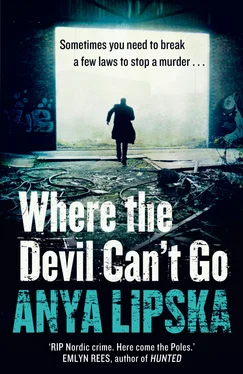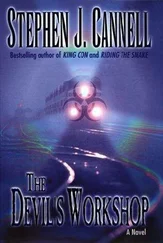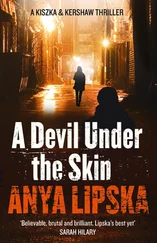FlashKlub, the place that Justyna had named for their rendezvous, was located in a basement under a semi-derelict fifties factory building in an area called Maryland on Stratford’s eastern fringe. The name might suggest rural romance, but the area was depressed and scruffy – no Olympic effect visible here. Lining up with a queue of youngsters chattering away in Polish he felt middle-aged, out of place, but the young bouncer showed no surprise, greeting him with a polite ‘ Dobry wieczor, panu .’ He did make an apologetic gesture at his cigar, though. Janusz ground it out on the pavement before heading down the rickety stairs toward the klub with all the enthusiasm of a man going to get his teeth drilled.
Justyna was sitting on a stool at the bar, fiddling with the straw in her drink. She was even more attractive than he remembered: glossy dark hair grazing her shoulders, eyes the colour of conac. She seemed relieved to see him – no doubt she’d been pestered non-stop by guys trying their luck. He ordered a Tyskie and another apple juice for her – she shook her head when he suggested a shot of bisongrass wodka to liven it up. Maybe she didn’t want to let her tongue run away with her, he thought.
A huge screen on one wall playing pop promos dominated the basement. The current one had been shot in some semi-derelict Soviet housing estate and starred two skinny crew-cut boys. Dressed like gangsters from an American ghetto, they bobbed and grimaced through a Polski hip hop number, their faces deadpan. Maybe he was just a narrow-minded old fart, but it set Janusz’s teeth on edge. The mindless beat and nihilistic lyrics struck him as an affront to the musical beauty of the language.
‘You don’t like it?’ she asked with a half-smile at his tortured expression.
‘No. Do you?’ he said, raising an eyebrow.
She shrugged. ‘Sure. I like all kinds of music.’
‘When I was your age, studying physics in Krakow,’ he said, ‘there was a craze in the cellar bars, for traditional music, folk, I suppose you’d call it.’
Her expression was attentive, but detached. She had one of those faces that you felt compelled to keep scanning because her emotions were so hard to read.
He paused, remembering those nights, the frenetic violins, the thrilling sounds infused with the wildness of Gypsy music, often a haunting woman’s voice in the mix, and felt the tug of nostalgia in his chest. He took a swallow of beer to cover his expression. ‘The thing was, the dumbass … excuse me … stupid Kommies thought traditional music was wholesome, harmless stuff – but of course, all those old partisan songs about carrying your heart around in a knapsack were dynamite.
‘The music had us stomping and cheering, climbing onto tables to sing along. After closing, all hyped up and full of wodka, me and my mates would dodge the police patrols and paint Solidarnosc graffiti all over town.’
‘Did you ever get caught?’ she asked. From the mild curiosity in her tone, she might have been asking about something that happened in the nineteenth century rather than two-and-a-half decades ago.
He hesitated. ‘Just once. There were three of us – my mates had hung me by my legs over the side of a railway bridge so I could paint some slogan or other. “THE TV LIES”, I think it was. When the milicja arrived, the lads just about managed to drag me back up, but by the time I was on solid ground they’d legged it and I got nicked.’
‘What happened to you?’
He looked away. ‘Nothing much, spent a night in the cell, got a few slaps, got sent home in the morning.’
Bullshit. The milicja had thrown him in the back of a van and taken him to Montepulich, Krakow’s notorious jail, where the Soviets had tortured and murdered hundreds of Polish nationalists after the war. It must have been a quiet night for them to commit so much time and effort to interrogating a seventeen-year-old boy over such a stupid thing – or maybe they just enjoyed their work. He’d been left with bruises and cuts that had taken weeks to fade, but they were nothing compared to the real legacy of that night, the thing that he carried inside him, like the shadow on an X-ray. He stamped the memories back down. Forget the past.
The girl and he gazed at the flickering video screen. The two boys were now in a car, lurching back and forward, zombie-like, to the beat. The camera cut to a shot of one of them, on his own, walking, before the camera pulled out to a wide aerial shot, revealing him as a tiny, lonely figure alone in a vast desolate wasteland.
She gestured with her chin. ‘He is like you, when you were young.’
‘Like me ?’
‘You and your friends, back then, under the Komunistow – life was bad, society didn’t work for you. This music – for young people it says the same as your folk songs, it says fuck your society, we do our own thing.’
He knew that it was common for young women to swear these days, especially the ones who’d been in England a while, but it still shocked him in an almost physical way to hear it. When he had been her age it would have been unthinkable to use such language in front of one’s elders.
‘Is that what you feel about Poland today?’ he asked.
She sipped her apple juice, eyes cast down. ‘I want to go back one day, I guess,’ she said, choosing her words. ‘But not yet. What is there for me, in Katowice? I would earn maybe half of what I get here – I’d have to save for years just to buy a five-year-old Polski Fiat.’
There was no anger, only a resigned pragmatism in her voice.
‘Here, once I learn English, I can get a job in Marks and Spencer and earn good money, go to college part-time.’
‘What will you study?’
Her eyes lit up, animating her whole face for the first time. ‘Physiotherapy, or maybe chiropractic, I haven’t decided yet.’
Janusz knew Katowice: a powerhouse of heavy industry under the Soviets, many of its residential districts were now half-empty, depressing places, peopled by the old, the sick, and by those who lacked either the resources or the courage to leave. The thought of living there made him shudder. Maybe his generation had been lucky, after all – at least fighting the Kommies gave them a sense of common purpose.
‘Zamorski is a good guy,’ he assured her. ‘If anyone can put the country back on its feet, he will.’
His words hung there, shiny and shallow sounding, as she gazed at him with dark brown eyes.
‘Politicians are all the same.’ Her tone was polite but decisive. ‘You and your friends thought that Walesa was superman, right?’
Janusz had to admit she was right about that. He had idolised Lech Walesa once, only to watch in horrified disbelief, after the Solidarnosc leader became Poland’s first elected president, as he fell out with some of the revolution’s brightest thinkers and surrounded himself with yes-men.
Zamorski shared Walesa’s Solidarnosc credentials, but displayed none of his demagogic tendencies and had already pulled off an impressive political balancing act, drawing on Poles’ instinctive conservatism while resisting the temptations of full-blooded nationalism. But spending the night arguing politics with the self-possessed Justyna wasn’t going to help him find the lost girl, thought Janusz. He sensed he’d have to go gently – if he came out and asked where Weronika was, she might just clam up.
‘Did you ever come here with Weronika?’ he asked, taking a slug of beer.
‘Yes, sometimes.’
‘Was it here she met Pawel?’ he asked.
The faintest frown creased her forehead, but she didn’t ask how he knew about Weronika’s secret boyfriend.
Читать дальше












